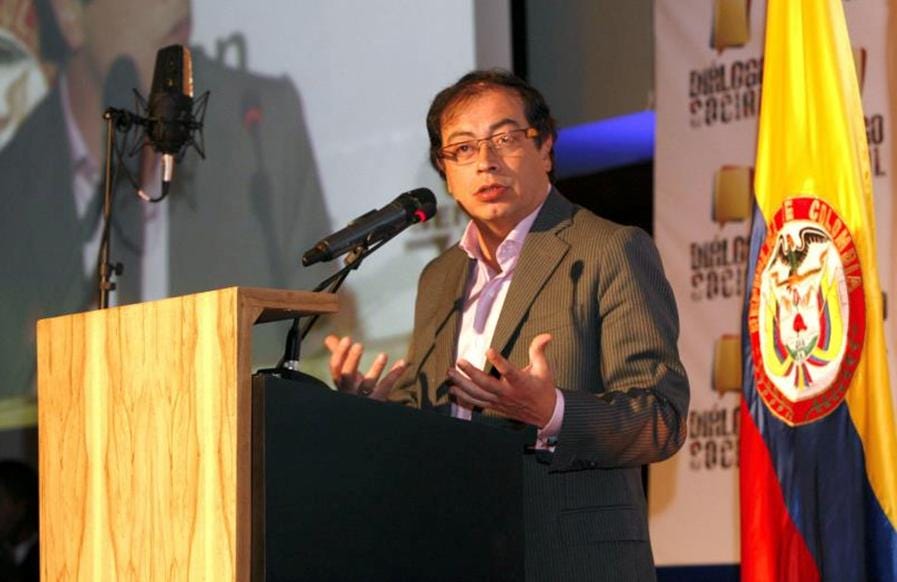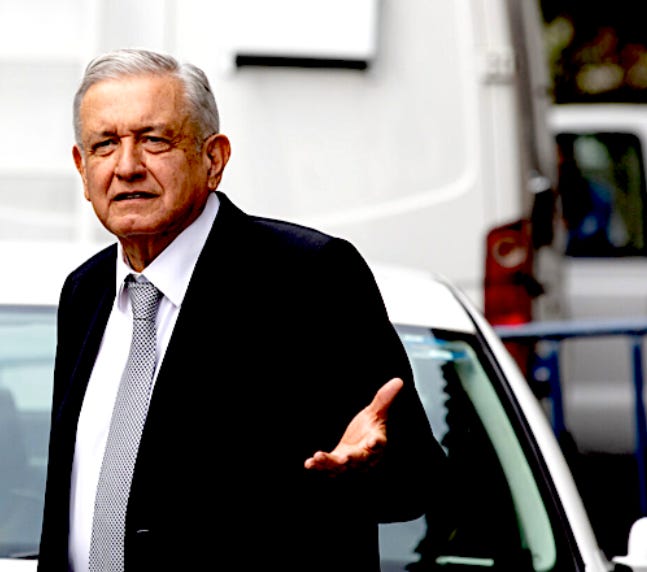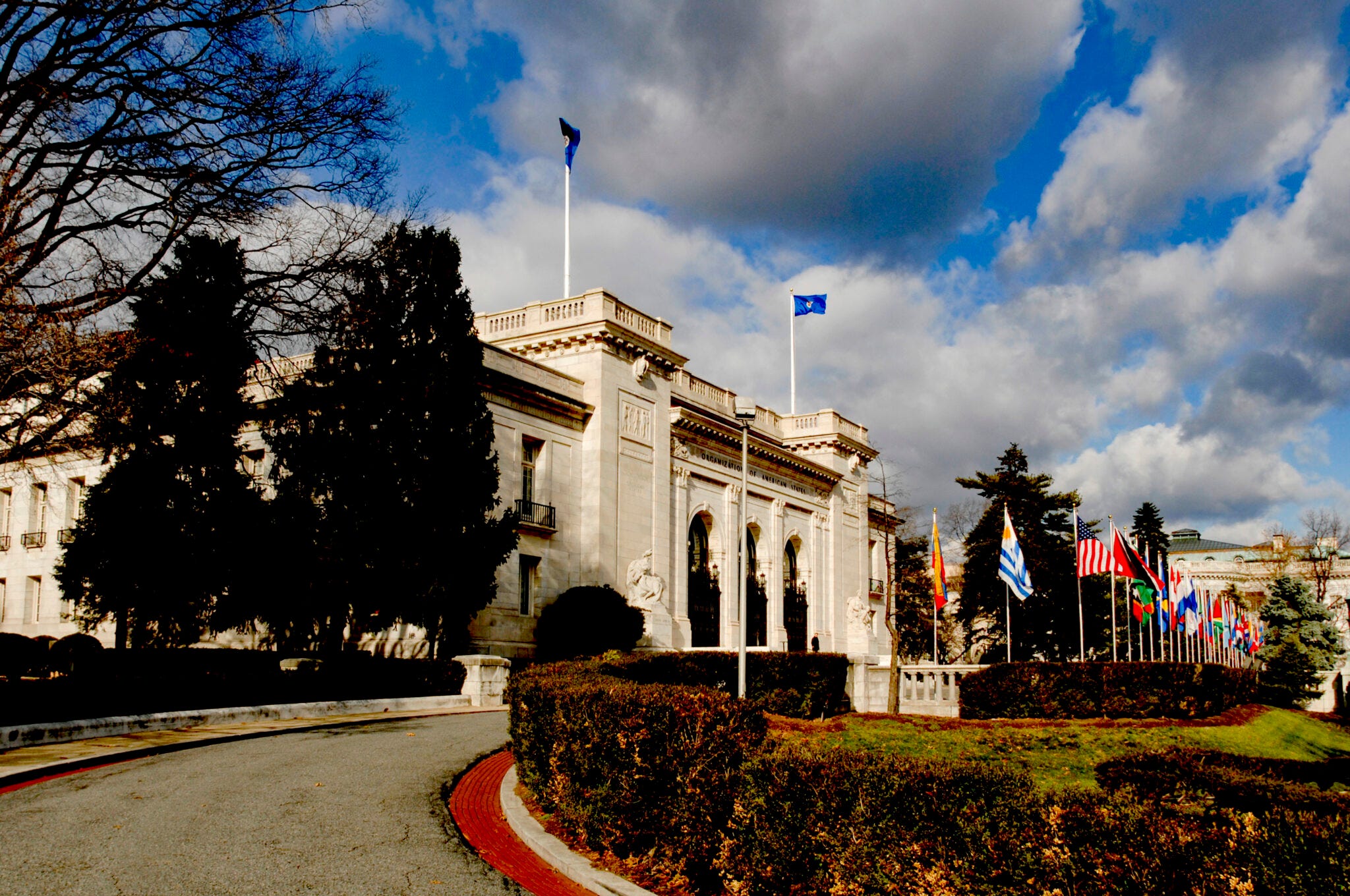
Colombia wins. Gustavo Petra turns the tide.
“Latin America’s Turning Tide”:
The South Is Turning Pink
Patrick Lawrence / The Scrum
(June 21, 2022) — It is difficult to overstate the significance of last Sunday’s elections in Colombia, which will shortly send Gustavo Petro to the presidential palace. Petro proposes fundamentally to alter the direction of Latin America’s fourth-largest economy and Washington’s closest client on the continent. Anyone who has not noticed or doubted that this region is in for change of historic magnitude may want to start paying attention and stop doubting.
Petro is the fourth social democrat Latin American voters have chosen to lead their nations in the past year — the sixth in the past four years. Let’s count them.
Pedro Castillo, a former unionist from a peasant family, was elected president of Peru last summer and took office in November. Xiaomara Castro, a popular front leader and wife of Manuel Zelaya, who was deposed in a US-cultivated coup in 2009, won the second round in Honduras that same month and took office last January. A month later Gabriel Boric — student activist, twice-elected to the Chamber of Deputies in Santiago — won Chile’s presidential contest; Boric assumed office last March.
We are watching a second Pink Tide as it flows across Latin America’s mountains, lakes, and pampas and down the avenues of its towns and cities. This wave started rolling in with Andrés Manuel López Obrador’s election in Mexico four years ago. A year later Alberto Fernández, a Peronist, won the presidency in Argentina. In 2020, Bolivians gave Washington a wonderful poke in the eye when they elected Luis Arce president. Arce is a member of the Movimiento al Socialismo, MAS, which Evo Morales led until the US backed a coup that sent him into exile three years ago.
I am not counting Nayib Bukele, who was elected El Salvador’s president in 2019. I find him too hard a read. Bukele has good bloodlines: Early in his political career he was a member of the Farabundo Martí National Liberation Front, the FMLN, but he has since come over as a main-chancer — bouncing from some kind of “third way” party of his own devising to center-left to center-right, each move according to opportunity.
Rotating the gaze, we find a big one out front by just a few months. Luiz Inácio da Silva, the tenacious “Lula,” is ahead of Jair Bolsonaro in the polls as Brazil’s October presidential elections approach. Lula’s charisma lends him a kind totemic presence on the Latin American political scene. He was a leader of the first Pink Tide, which dates to the 1990s, when Argentina, Brazil, and Venezuela turned sharply against the neoliberalism of the “Washington Consensus.”
That wave ebbed in the first decade of the new century, a consequence of various economic coercions and political subversions. In Venezuela, Hugo Chávez was ousted for 48 hours in 2002 — a punctuation mark, perhaps. The first Pink Tide was on the way to over.
Each of these new administrations has tasks specific to its circumstances. Gabriel Boric was instrumental in organizing the 2019 referendum calling for a new, post-Pinochet constitution in Chile, and he will preside over the nation as the Constitutional Convention shapes it. Gustavo Petro, among much else, plans to move Colombia away from its dependence on fossil fuels and halt rampant, egregious deforestation in Colombia’s portion of the Amazon basin.
Let us make use of Petro’s program to consider this second Pink Tide more generally.
The 62–year-old Petro was a member of the M–19 guerrilla movement back in the 1970s, and it shows. His focus is on reducing hunger, poverty, and inequality, ending state-sponsored corruption and violence, and breaking the hold of the few dozen families that, in time-honored Latin American fashion, have controlled the nation for the past two centuries.
Colombians are looking at a vastly expanded role for the state in the economy and many aspects of national life. They need it. The poverty rate is now 42 percent; youth unemployment is north of 20 percent.
On the policy side, Petro proposes to halt all new oil exploration and open-pit coal-mining projects — the nation’s core industries — and tilt the economy toward renewable energy, manufacturing, and tourism. Land reform is another major promise. Petro wants to “democratize land” by redistributing unused tracts to the landless. This last will get done by way of credit extension and facilitated sales, not expropriation — this s touchy topic among the landed elites.
Extensively expanded social programs, guaranteed employment, subsidies for single mothers and food, expanded access to higher education, a public health care system — these are all on Petro’s clipboard. As oil revenues decline, he plans to raise taxes on businesses and private wealth while closing gaping loopholes in the tax code and imposing tariffs as part of a classic import-substitution strategy to encourage the domestic industries — textiles, farm products — typically on the lower rungs of the development ladder.
If this were the Philippines, I’d call Petro a “people power” president, though I hope he does better than Corazon Aquino, who had nothing to offer Filipinos but milk and cookies after she succeeded the Marcos circus. Colombians deserve more than the junk of a few feel-good policies.

¡Basta ya! Mexican President López Obrador
Petro’s ambitions can be read as broadly emblematic of the second Pink Tide. To [call] this a leftward shift is fine but misses the larger point. As López Obrador and others make clear every chance they get, we also witness an assertion of sovereignty and postcolonial pride. Nobody is judging anyone else’s political stripe.
This is why I expect Pink Tide II to hold. You have to look at the longue durée, history’s enduring wave.
A fundamental shift in sentiment is evident across the continent, and it appears to run more deeply than it did decades back. The region appears to be more committed to economic policies that serve its populations, to integrating the indigenous, and to ridding itself of the corrupt leaders los norteamericanos have long favored.
The new Pink Tide’s leaders are also more conscious of the Latin America’s common identity and are increasingly intolerant of the long record of US interventions, coups, occupations, electoral interference, and the rest of the entries in Washington’s blotted copy book.
Could this last point have been any clearer than when López Obrador, Arce, Castro, Alejandro Giammattei of Guatemala, and Bukele pointedly declined to join President Biden at his Summit of the Americas in Los Angeles earlier this month, joining to protest Biden’s refusal to invite Miguel Díaz–Canel, Nicolás Maduro, and Daniel Ortega, the presidents of Cuba, Venezuela, and Nicaragua respectively?
Add it up. Eight of the region’s 33 nations were absent when Biden convened the summit “to demonstrate the resurgence of US leadership in the region,” as the government-supervised New York Times forlornly put it. Don’t they ever get tired of these exhausted phrases over on Eighth Avenue?
“There can be no Americas summit if all the countries of the American continent do not participate,” López Obrador explained at a press conference announcing his decision. “Or there can be, but we believe that means continuing with the politics of old, of interventionism, of a lack of respect for the nations and their people.”
Well said, Señor Presidente. Speaking yet more bluntly, Evo Morales, Bolivia’s president until the US had him ousted, called the summit “stillborn.” There is nothing like clear, plain language to get a clear, plain point across.
Gustavo Petro has problems coming at him already, and other new leaders share many of them. It is clear the technocrats among his advisers are likely to set limits on his declared aspirations, but will he get his programs through Congress, where he will need to build coalitions, more or less intact once they are turned into policies on paper? Will his projected revenues pay for his policies? Will his fossil-fuel policy get knocked back in consequence of the global energy crisis?
The Central Bank of Colombia was working against Petro even before he was elected. In April it raised interest rates 100 basis points, to 6 percent — a policy intended to suppress demand and economic growth in response to rising inflation, which is now running above 9 percent. This is the standard stuff of the austerity hawks and will work against Petro so long as the central bank proceeds in this direction.
More questions. Will the conservative elites who backed the repressive regime of Iván Duque Márquez organize to subvert the Petro government, violently or otherwise? Ben Norton, Multipolarista’s able editor and publisher, reported Monday that Eduardo Zapateiro, the Armed forces chief, attacked Petro on Twitter immediately after his victory, a violation of laws barring the military from political interference. Let us hope this is not what it looks like, a warning shot across Petro’s bow.
The far larger question of Washington’s reaction to Petro’s victory is my first concern. Colombia has long been the foundation stone of US influence in Latin America. In my read Petro’s victory at the polls is another sign among many that Washington is losing its hold over its southern neighbors. If this signals the historic turn I think it does, we are watching as the continent begins to reverse more than a century of usually coercive influence.
I do not like the silence so far in Washington, not one bit. Biden does not appear to have picked up the telephone to convey to Petro the customary congratulations. Secretary Blinken does not seem to have taken to Twitter to extend the same courtesy. Do we have an ominous sign of things to come?
There are two ways to read this.
On one hand, the sweep and vitality evident in this second Pink Tide suggest it is simply no longer possible for the US to carry on subverting this, that, or the other nation to install another dictator that takes its orders. Gustavo Petro’s win makes this point pretty plainly. It’s too late for all that.

Organization of American Subterfuge. OAS’ Washington HQ.
On the other hand, Biden, Blinken, National Security Adviser Jake Sullivan, and those around them have demonstrated plentifully by now that they are too stupid, too insensitive, and too caught up in the ideology of exceptionalism to realize what time it is on history’s clock. This suggests they will carry on in Latin America as have countless American regimes in the past.
Unfortunately, these two interpretations do not cancel out. It seems to me probable, indeed, that Latin America is turning a page in history and those in Washington either do not understand this or cannot face it.
In sum: If the US does choose to move against the Petro government, which we cannot by any stretch rule out, the mess will be dreadful.
A year ago López Obrador proposed replacing the Organization of American States, which Washington has reduced over many years to a ventriloquist’s dummy many Latin nations no longer take seriously, with a truly autonomous organization — “not a servant to anyone, but a mediator,” as he put it at the time. He subsequently called for a continent-wide institution similar to the European Union.
Who knows how long it will take for such ideas to bear fruit, if, indeed, they are destined to? But Latin America’s direction is clear, and it is not toward Washington.
Latin America suffered arguably more than any other region in the Global South during the first Cold War if we measure this by the violent dictatorships the US supported for decades in the name of countering an imaginary “Communist threat.” What Washington truly feared, as argued severally in these columns, was a working social democracy that inspired others.
Success in one nation would induce others to make the same attempt. The US would sustain a fundamental loss of control. We can only hope this is what we witness now — the imperium’s nightmare coming true.
After the L.A. summit flopped, I recall thinking, Oh, good, another failure for our inexcusably bad foreign policies. I say this not because I dislike my country, though I am not much for nationalism patriotism. I say it because I refuse to surrender the thought that America has the potential to do better.
Latin America and, indeed, the rest of the world will be better off when American primacy passes into history, So will Americans. The Spaniards, let us not forget, were better off once we relieved them of their empire during and in the aftermath of the Spanish–American war.
Let events relieve us of ours.
This is an extensively revised version of a commentary that first appeared in Consortium News. Posted in accordance with Title 17, Section 107, US Code, for noncommercial, educational purposes.